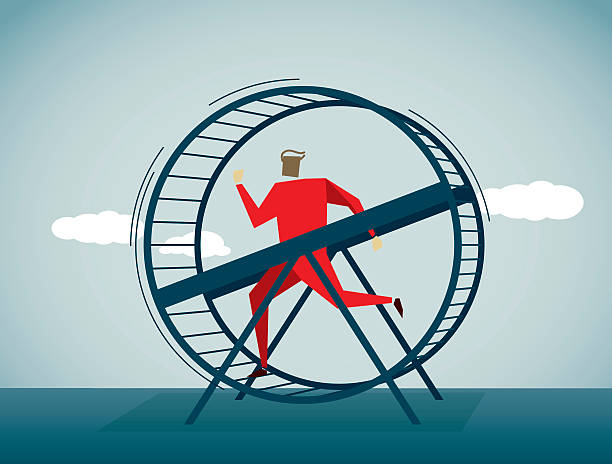Are you working your tail off to achieve certain goals or certain levels of success, but you do not feel like you are making any progress or that your efforts are not paying off? Do you feel like you are just spinning your wheels?
That can be incredibly frustrating. I have been there. I avoided setting goals for about 10 years because I got so frustrated with not being able to accomplish my self-improvement goals. In some ways, I am still bitter about it. The emotions are rising within me as I am writing this.
But hindsight is 20/20. And, it has only taken me 10 years to gain clarity on why my efforts ended in frustration rather than success.
There are three primary reasons why your efforts may be ending in more frustration than success. And, if you can awaken to these reasons within yourself, you will hold the key for unlocking the success you desire and are seeking.
Reason #1: You blame external factors for your failings

When people are trying their best and working hard, yet not seeing success, they are left trying to make sense of their situation. In their processing, because they feel like they are trying their best and working hard, they are often quick to jump to the conclusion that the problem is not them, but rather the problem is caused my external factors (e.g., luck, the economy, a competitor).
This form of reasoning is a common decision-making error called self-serving bias, which suggests that we are prone to blame external factors when things go bad (e.g., “We lost the game because of the refs”) and blame internal factors when things go good (e.g., “Our team doubled-down our efforts, allowing us to come out on top”).
I saw this recently, let me give you an example.
I used to work for a leader that had a self-serving mindset. This led him to engage in practices that he considered to be reasonable, but most in that particular work environment considered them to be inappropriate. These practices included making his administrative assistant clean his personal office, texting his employees after reasonable hours, and calling them at inappropriate times. So, when he went through several administrative assistants over the course of a year, he blamed the organization’s inability to compensate the employees adequately as opposed to his poor leadership and management. The reality is that he was doing and trying his best. It just so happened that his self-serving mindset led him to engage in behaviors that were “best” for him, but not for the people he led and managed.
When things are going wrong, it is best to start by looking in a mirror before looking out the windows.
Reason #2: You blame the wrong internal factors for your failings

If you are able to not engage in self-serving bias, and look internally for the cause of your failings, that is a sign that you are heading in the wrong direction.
But unfortunately, when people do this, they commonly blame the wrong internal factor, misdiagnosing the cause of their lack of success. This can be problematic because as when you try to play doctor with your life and your success, misdiagnoses will lead to engage in treatments that are unlikely to fix the problem.
Most commonly, when people blame internal factors for their lack of success (e.g., not getting promoted, not getting the grade they want, or not reaching their goals), they specifically place the blame on their talents and abilities.
I see this all of the time with the students that I teach. When my students under-perform relative to their expectations, their most common reaction is that they do not have the talents and abilities to succeed with the subject. This leads them to treat the issue by either dropping the class or disengaging from the class.
This leads us to the third reason why your efforts may be ending in more frustration than success.
Reason #3: You overlook your mindsets

A primary reason many people misdiagnose the cause of their failures is because they overlook their mindsets.
You see, our mindsets drive our thinking, learning, and behaving. Thus, they are foundational to our success. Stated differently, what this means is that when we are not as successful as we think we should be, a common cause is that we possess mindsets that are preventing us from thinking, learning, and behaving in more successful ways.
But, most people do not even consider that their mindsets may be the primary reason they are not seeing the success they desire. This is because most people do not know:
-
About mindsets and the foundational role they play in our lives
-
What mindsets they personally possess that may be holding them back
-
What mindsets might be more conducive to their success
This is a huge problem! What I am suggesting is that the primary reason why most people are not as successful as they would like is because of their mindsets. But, most people aren’t even aware that their mindsets are the problem. And if they were, they likely wouldn’t even know how to go about addressing their problem because they wouldn’t know what mindsets to focus on and what mindsets to develop.
Using my under-performing students as an example. What they fail to recognize is that they possess mindsets that prevent more healthy (1) study habits and (2) reactions to under-performance and failure. And, without the ability to properly diagnose their problems, they are unable to treat their problems, leaving them to continually flounder.
Moral of the Story
If you want to be less frustrated and more successful with your efforts, you need to start focusing on your mindsets. As you improve your mindsets, your thinking, learning, and behavior will naturally improve; and consequently, so will your success.
To help you with this, I have developed this free personal mindset assessment for you to diagnose your current mindsets and learn about what mindsets you need to develop to unlock greater success in your life, work, and leadership.










